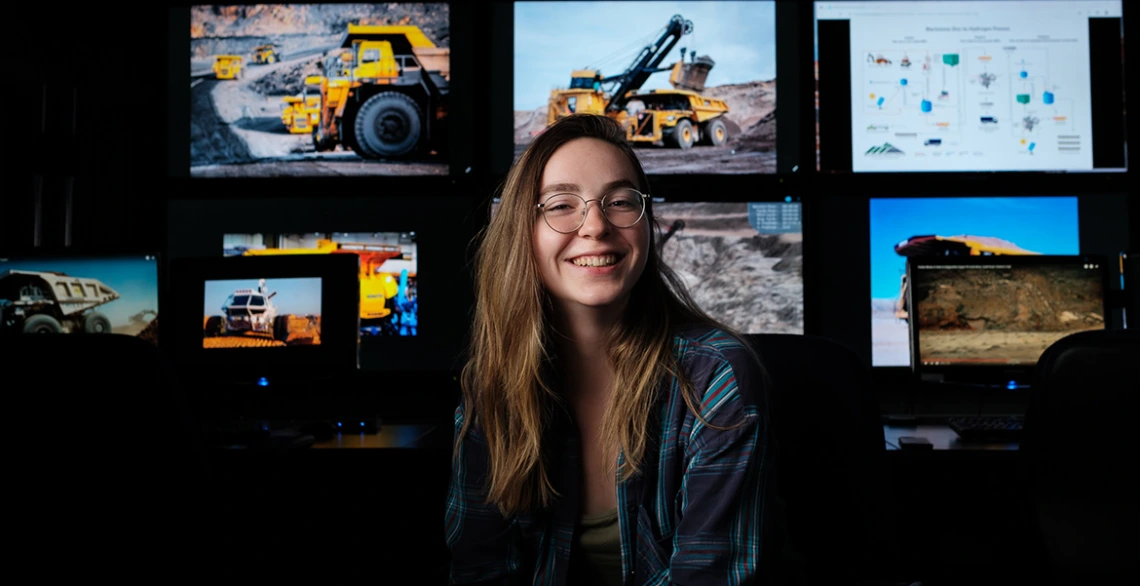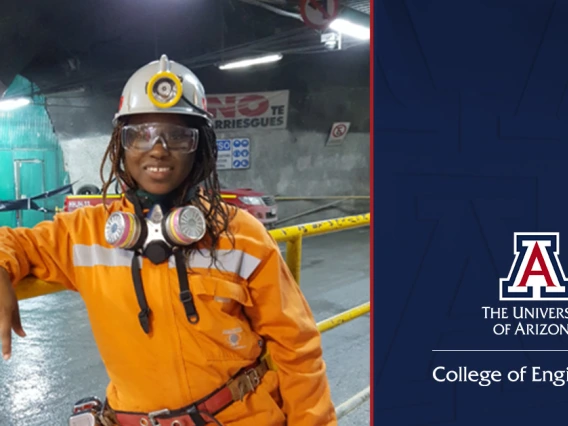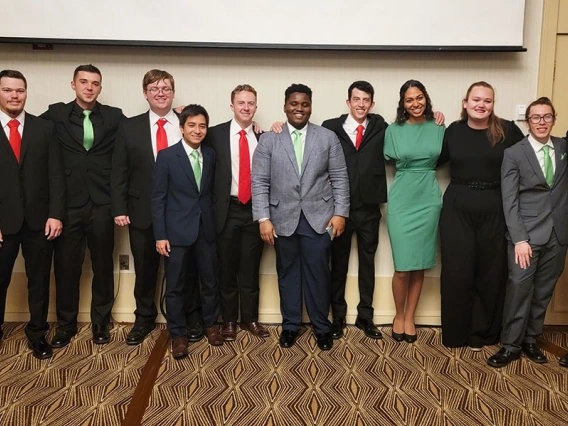Students Form Women In Mining Chapter
Attending the national WIM conference in Tucson is one way members are learning to build an inclusive and sustainable future.

Graduate student and Women in Mining student chapter member Nilufer Akbulut received a scholarship from WIM Arizona, as well as sponsorship to attend this year’s WIM USA National Conference in Tucson.
When Greatness Ojum was in her first year of mining engineering studies, she met Julia Potter, co-director of the Geotechnical Center of Excellence and vice president of Women in Mining USA. Potter told her about an opportunity to launch a University of Arizona student chapter of the organization, which has supported an equitable and sustainable mining industry since 1972.
“As a freshman, that was very overwhelming for me. It was like, ‘Oh my gosh – it's a lot of work,’” said Ojum, now a sophomore and president of the UA WIM student chapter, as well as its founder. “But it was something that I wanted to get involved in … so I took the initiative and got some students together.”
Preparing Today
The WIM Arizona chapter sponsored Ojum and six other WIM UA chapter members to attend the WIM USA National Conference, to be held in Tucson April 12-15. Ojum values the chance to expand her professional network and gain technical expertise and knowledge about what to expect when she enters the mining industry.
Angelina Anani, the WIM UA student chapter advisor and an associate professor of mining and geological engineering, or MGE, is a panelist for a workshop focused on how to improve Diversity, Equity, and Inclusion, or DEI, in the mining industry. The panelists will share case studies and personal stories.
Attendees are often the only women in their departments, and they feel alone in dealing with difficult situations that can arise in a male-dominated profession, said Anani.
“Being able to talk to other women and understand where the challenges are and how they’re dealt with, I think will be very helpful.”
Ojum has found such discussions important since forming the WIM student chapter.
“Having mentors all around has been a big plus for me,” she said. “I feel much more equipped than I would if I didn’t have those conversations.”
When Potter spoke with Ojum, Anani and others about establishing a student chapter, she wanted to extend the kind of rewarding camaraderie she’s found within WIM. Potter spent a decade in the industry before joining WIM four years ago to meet industry peers, role models and mentors.
“I’d also love for the next generation to have what I didn’t have – more women in the industry to look up to, so they think they can do it, too,” Potter said.
Potter and other organizers designed the conference to encourage interaction between professionals and students. After every session, a breakout discussion will keep the topic going in smaller groups. The conference also offers mine tours, professional development content, and lots of networking – which Potter calls “the biggest value-add,” both for students and those in a position to employ them.
“I can’t stress enough how valuable it is for all of them,” she said. “Talent is tough to find right now, so everyone is excited to have students there and get face time with the best and brightest.”
Platinum conference sponsor Caterpillar will announce a new mentorship program. Caterpillar was joined at the platinum level by BHP, Hexagon, Rio Tinto and South 32. The highest-level sponsor is Freeport-McMoran, and more than two dozen additional sponsors supported the event.
“You can really see how supportive this industry is of women in mining, which is neat for our students to see as well,” said Kray Luxbacher, the Gregory H. and Lisa S. Boyce Endowed Department Leadership Chair in MGE.
The industry faces a well-recognized labor shortage, and leaders are invested in improving diversity, said Luxbacher. One reason is that they want to ensure their workforce reflects the communities they’re operating in. Another is more practical, as sharp increases in mining are required to meet aggressive sustainability targets set by governments and businesses.
“We need everyone engaged. New solutions are needed in mining. We all know that innovative teams are diverse teams,” she said.
These circumstances are partly what drew Ojum to the field.
“I really want to be involved in an industry where even a little advancement could have a big impact on really the world in general,” she said.
Fostering Club Growth
The seven-month-old WIM student chapter has attracted 17 members so far, and Ojum and Anani see growth as one of their biggest focus areas. They want to spread the word and attract more membership from males and students outside MGE and the university’s School of Mining and Mineral Resources.
Welcoming these populations is a foundational goal for WIM chapters at every level and benefits all participants, said Anani.
“We’re talking about surveyors, people in human resources, it’s very broad. We want people to understand that regardless of your background, you can go into mining. We also want you to be included in overcoming some of the challenges and enjoying some of the benefits that we have in mining,” she said.
This interaction is also valuable for those who plan to become mining engineers. WIM member Nilufer Akbulut, a graduate student in mining, geological and geophysical engineering, has enjoyed attending meetings where engineering students from other majors contributed to the discussion. She likes WIM because it’s inclusive of academic disciplines and genders.
“It actually feels like an equal space,” Akbulut said.



